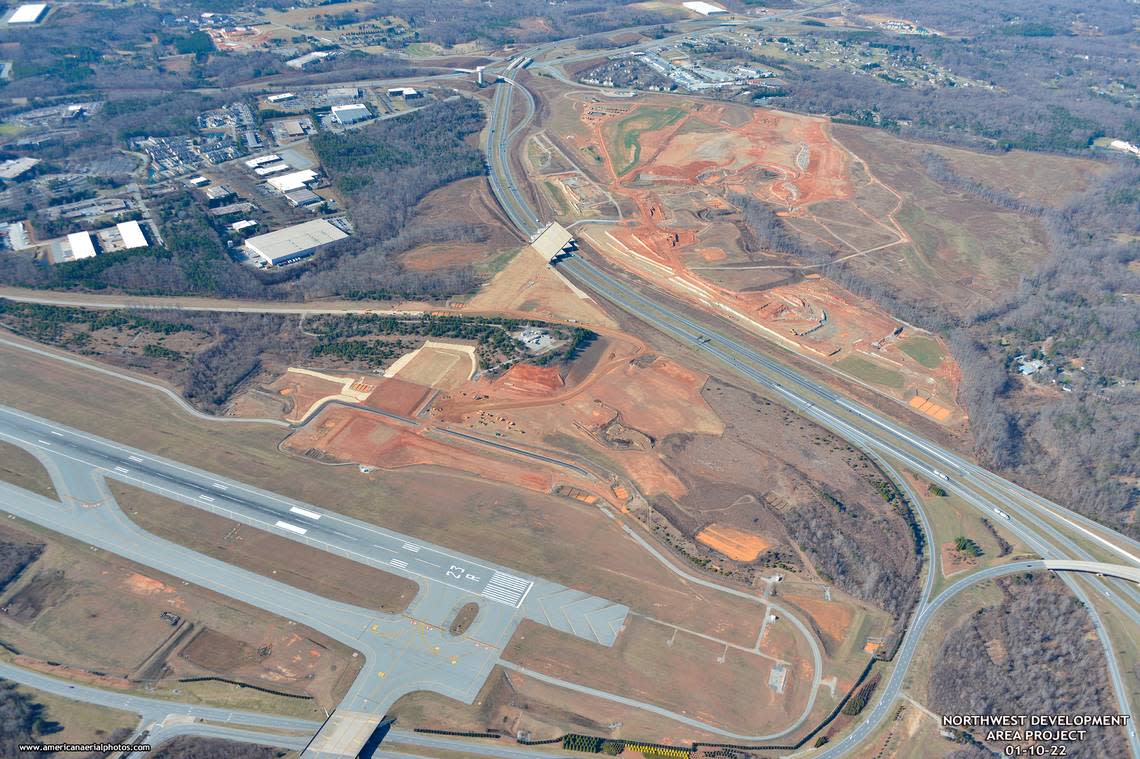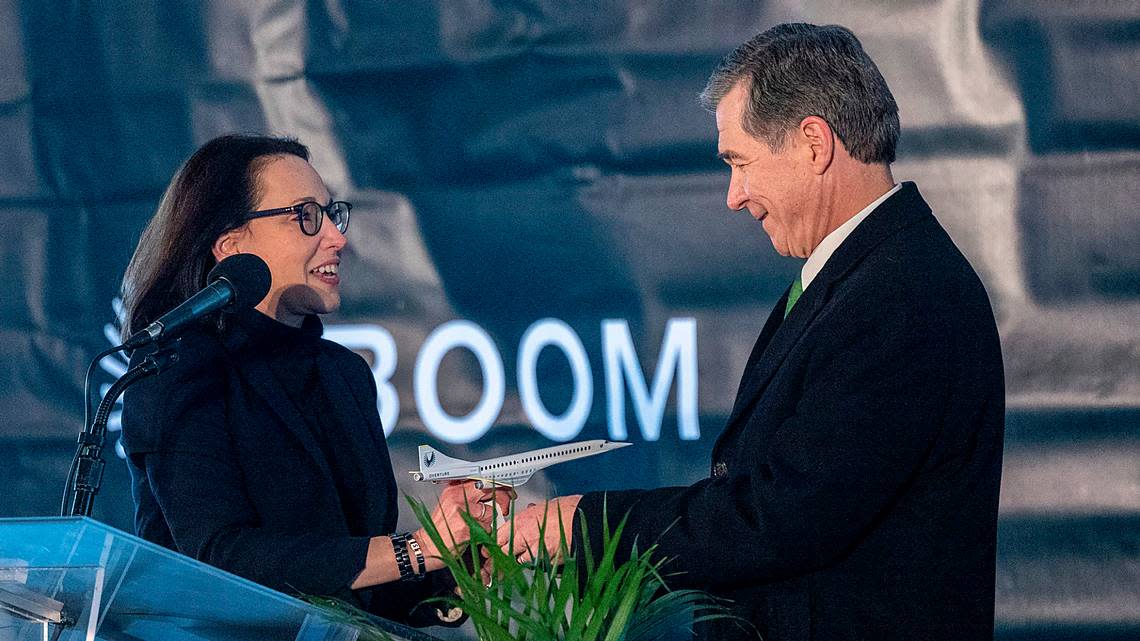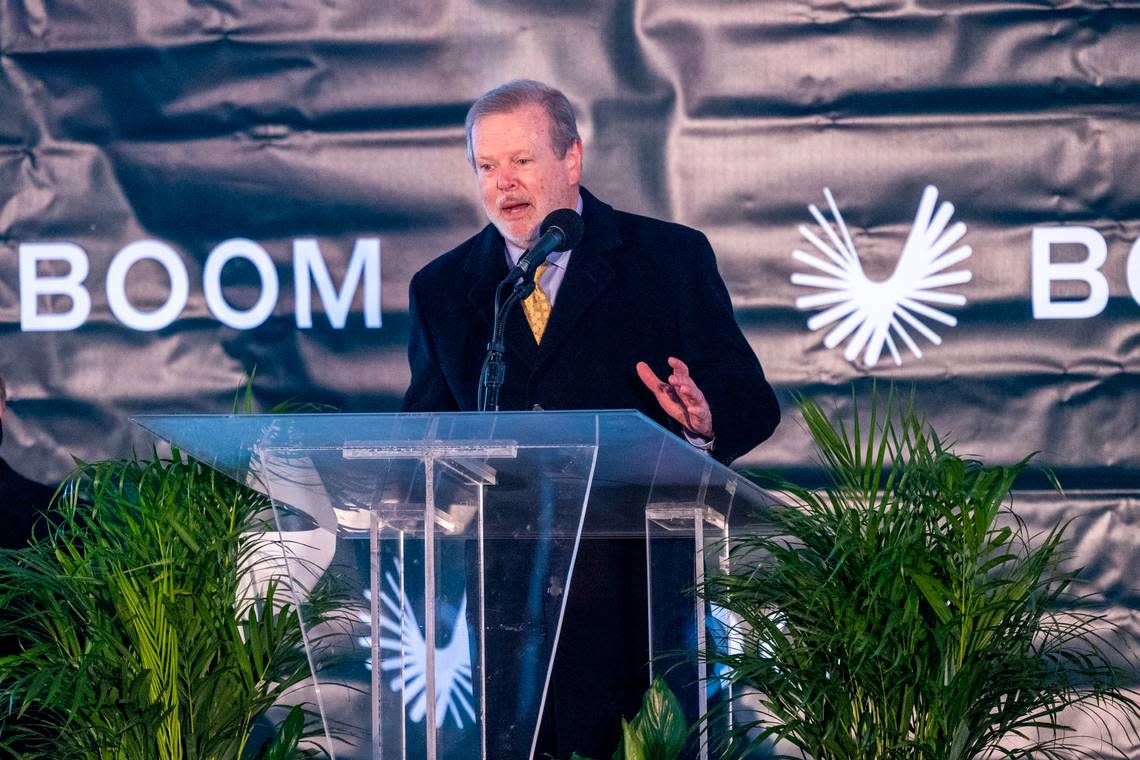How NC nearly lost and ultimately beat out Florida for Boom Supersonic
In late January, North Carolina leaders gathered at Piedmont Triad International Airport near Greensboro to celebrate another major business coming to the state.
After landing Apple and Toyota, but before attracting the electric car manufacturer VinFast, North Carolina announced that aerospace startup Boom Supersonic would open a facility at the airport to assemble and test its new supersonic Overture, a slender-nosed, four-engine aircraft that hopes to transform commercial and military flight.
Described as the world’s fastest airliner, it plans to cruise at 1,300 mph over water and 770 mph over land, both topping the speed of sound.
Boom promises to employ 1,761 people and invest $500 million by the end of the decade. The Colorado-based company will begin hiring workers in 2026, and the North Carolina Economic Investment Committee calculates Boom’s presence over the next two decades will contribute $32.3 billion to the state economy.
Championing the news at the Piedmont airport in January, Gov. Roy Cooper called it “both poetic and logical that Boom Supersonic would choose the state that’s first in flight for its first manufacturing plant.”
But while Cooper’s comment hinted at an inevitability of a Boom and North Carolina marriage, internal North Carolina Department of Commerce documents, obtained and reviewed by The News and Observer, show state officials spent months believing they were losing the aerospace company to Florida.
Competition from the Sunshine State, the documents show, pushed North Carolina to appropriate an additional $56 million to construct two aircraft hangars for Boom. This extra funding, one Department of Commerce memo asserted, was needed to “keep us in the game,” with Florida.

Even then, it appeared Boom would choose Jacksonville over Greensboro for the facility both North Carolina and Florida covertly referred to as Project Thunderbird. Last summer, the company “went silent” with North Carolina officials, and in late November, state officials urged Gov. Roy Cooper to reconnect with Boom CEO Blake Scholl to draw the company away from Florida.
Altogether, the 1,383-pages of Commerce Department documents reveal how competition between states can shape incentive packages and leave officials searching for intel.
“It’s a lot like poker,” said Dale Ketcham, a spokesperson for Space Florida, the economic development agency that lost out to North Carolina on the Boom sweepstakes. “You don’t really know what the other state is holding in his hand. But the company does.”
Playing the incentive game
When it comes to doling out big incentive packages, competition is required. Under North Carolina law, state tax incentives can only go to businesses that are considering at least one other state for their projects.
In April 2021, North Carolina awarded $846 million in tax incentives to attract Apple away from Columbus, Ohio, while between state and local incentives, Toyota received more than $430 million to pick North Carolina over nine other states for its electric car battery plant in December. In March, VinFast secured $1.2 billion in upfront funding and future tax relief to come to Chatham County rather than Savannah, Georgia.
Some have questioned the value of these competitions.
Last year, the Michigan-based advocacy group Center for Economic Accountability (CEA) named North Carolina’s Apple agreement the “Worst Economic Development Deal of the Year,” with its president John Mozena saying in a press release, “as with all truly bad subsidies, North Carolina’s elected officials gave a big company a giant pile of money to do what that company was already going to do anyway.”

Mozena noted the Research Triangle — with its network of heralded universities, skilled work force, and business-friendly regulations — was set to attract big tech businesses regardless of the extra public money thrown their way. He dismissed statements from the N.C. Department of Commerce that the incentives were needed to entice Apple away from Ohio.
But the internal correspondence between the Department of Commerce, the Economic Investment Committee, the Governor’s Office and legislative leaders indicate a belief that a highly competitive funding package was needed to win Project Thunderbird.
Nathan Goldman, a North Carolina State University professor who specializes in corporate taxation and incentives, said North Carolina, unlike a state like California, still needs to provide incentives to draw in these big out-of-state employers.
“There will probably be an inflection point where North Carolina doesn’t need to offer incentives, but I think it’s quite a ways until we hit that,” he said. “When a company is choosing between two states, and one offers an $80 million project and the other a $100 million project, it can make a difference.”
Winning Thunderbird
Early in North Carolina’s recruitment of Project Thunderbird, Boom CEO Scholl made two trips to the Tar Heel State. His second visit on May 26 included a site visit to the airport and a dinner meeting with Cooper.
But after this visit, the Department of Commerce said Boom “slowed the site selection process” and became “less engaged with the state and local economic development representatives.”
At this time, the department believed Florida was “in deep negotiations” with Boom based on “intelligence” it had received from the consulting firm Boom used to assist with its site selection. Space Florida eventually approved $710 million in financing to build facilities in Jacksonville.

North Carolina’s original incentive package included more than $90 million in payroll tax breaks over the next 20 years and $50 million to complete site work for Project Thunderbird. But aware of Florida’s greater upfront commitment, the Commerce Department asked the General Assembly to fund an additional $56.75 million for the construction of two aircraft hangars for Boom to use at the Piedmont Airport.
In late August, the office of North Carolina Senate Leader Phil Berger informed the Commerce Department that Berger would back the hangar funding, and the money was added to H.B. 334, which Cooper signed in December.
Yet even with more money, state officials still perceived Florida to be in the driver’s seat.
Then in November, talks between Boom and the Sunshine State soured. That month, a N.C. Department of Commerce briefing noted Boom’s negotiations with Florida “have not turned out the way the company expected.”
In a Nov. 23 email to Cooper adviser Ken Eudy, Susan Fleetwood of the Department of Commerce recommended the governor reach back out to Scholl because “the company has renewed its interest in North Carolina.”
Soon, North Carolina was ironing out the final details to secure Project Thunderbird, and on Jan 26, the same day state officials celebrated Boom’s arrival, the state’s Economic Investment Committee unanimously awarded the company a $90 million Job Development Investment Grant incentive.
So, what made Florida lose out?
Asked about this, Boom spokesperson Aubrey Scanlan instead listed some of the reasons North Carolina “emerged as the clear choice,” including its skilled workforce, high number of veterans, strong higher education institutions, and closeness to the Atlantic Ocean for testing. She did not mention Florida in her response.
Dale Ketcham of Space Florida said he wasn’t aware of any particular “hiccup or landmine” that turned Boom away from his state, and he added that the only ones who may ultimately know the answer are Boom’s leaders.
“Florida put its best offer on the table and the company went a different direction, which is how things work,” he said, adding he expects this won’t be the last time the two states vie for the same business.
This story was produced with financial support from a coalition of partners led by Innovate Raleigh as part of an independent journalism fellowship program. The N&O maintains full editorial control of the work.
Local impact
Philanthropy plays an increasingly important role in local news — including at The N&O. Stay on top of community-supported journalism at The N&O with our monthly newsletter. Sign up here.
